Reflections of a Global Health Nurse

By Patrick Smith '16 BSN, RN
Leaving Villanova, I took an unconventional first step into my nursing career. As I told people about my plan to pursue a Fulbright research grant in Lesotho, a small and mountainous kingdom in southern Africa, questions about the who/what/when/where/why/how came frequently, accompanied by an inquisitive follow-up:
“Wait, so you’re not going to be a nurse?”
These questions, in concert, spawned a new inquiry for me to ponder: what, exactly, is a nurse?
As you might expect, I do not presently have an all-encompassing answer. In Lesotho, as in nursing school, and as in life, I have found that open-ended questions tend to beget new questions just as frequently as they yield clear answers. Still, some things are as certain:
In Lesotho, where patients face vast sociocultural, financial, and topographical barriers to care, nurses are the backbone of a system trying to confront some of the worst health outcomes in the world – including, but not limited to, a life expectancy of 51 years.
In mountainside settlements, where the lifetime risk of maternal mortality is roughly 50 times that in the United States, nurses are providers of antenatal care, facility-based deliveries, and postnatal follow-ups that save lives. In rural villages and in cities, where the adult prevalence of HIV/AIDS hovers around 25% and incidence of tuberculosis is among the highest in the world, nurses promote population health by assessing, prescribing, and educating. And in the absence of a robust allied health workforce, nurses balance the professional responsibilities of clinicians, pharmacists, data clerks, and more.
In Lesotho (as everywhere), nurses’ work is not easy. In remote health centers, far off of paved roads, many sacrifice family and freedom to treat patients with maladies ranging from gastroenteritis to multi-drug resistant tuberculosis to diabetes. While recent facility renovations have increased the availability of water and electricity in clinics, these things are never taken for granted – particularly when mothers enter labor in the middle of the night. In the dry heat of December, and the blustery snowfall of July, nurses work to reach communities next door, as well as the ones which are an eight hour walk away. As in the United States, they perform all these tasks while coping with wide-ranging challenges – staffing shortages, non-adherent patients, and public health systems in desperate need of strengthening.
Which brings me to point one: nurses, in their compassion and their resiliency, are an inspiration.
As a newly-minted RN in Lesotho, I have rarely engaged in the practical, clinical operations typically associated with our profession. I haven’t touched a vaccine vial since 2015, and most days, my stethoscope rests on my wall rather than my shoulders. If frontline nurses may be considered witnesses to the most inspiring and heartbreaking stories in the world, my job as a public health researcher is a comparatively easy one: to listen to these stories, work to understand the relationships between them, and, where possible, group them into an anthology that offers others – researchers, policy makers, program staff – potential paths forward.
Yet in my day-to-day work, which involves conducting interviews, collecting and analyzing data, and making recommendations, the nursing process is ever-present. Exposed to new settings, nurses’ skills – open communication, motivational interviewing, and a desire to heal systems, be they biologic or social – do not wither. Rather, they grow, enabling us to provide care in varied settings, from ICUs to homes to the venues where policy is made.
Which brings me to point two: regardless of discipline or venue, the skills one learns as a nurse – to assess, advocate, and care – are broadly applicable. Moreover, in fields such as public health, they are indispensable.
It has been a privilege for me to live in Lesotho, grappling with an understanding of what it means to be a nurse working in global health equity. If you have an interest in learning more about the field, the Fulbright Student program, or non-clinical paths within nursing – please feel welcome to contact me at psmith22@villanova.edu.
